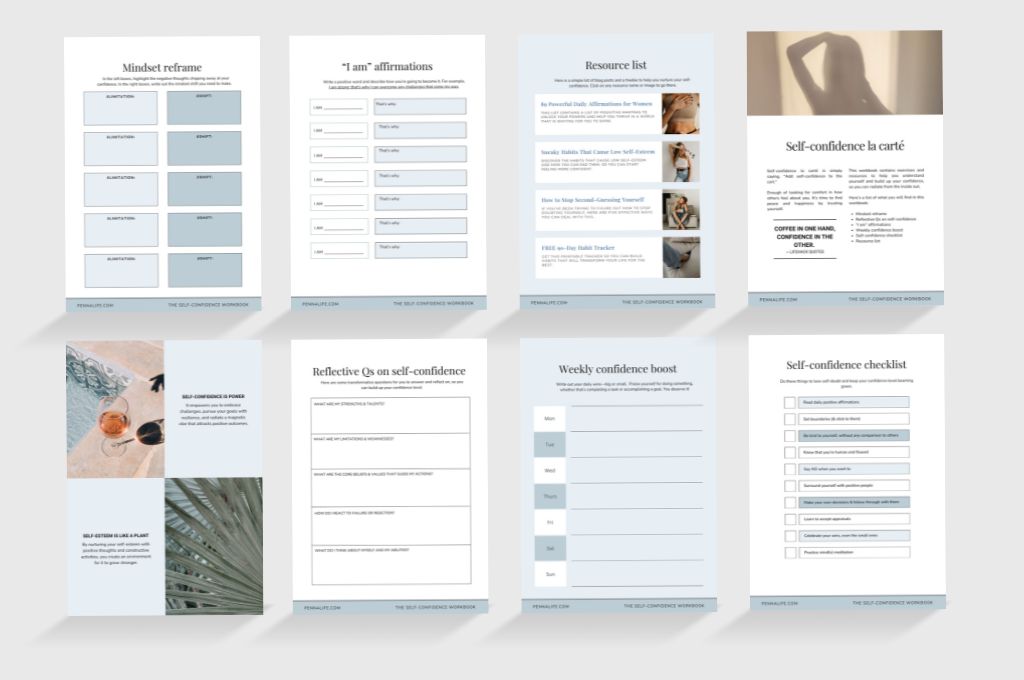Want to learn how to trust yourself? Here are 8 changes to make to develop more self-trust.

Ever find yourself at a crossroads and you’re looking for external advice on finding the right path? More often than not, it’s because you don’t trust yourself.
Self-doubt creeps into our lives without us even realizing it. It reflects when you can’t decide what to order after standing for 30 minutes in a coffee shop and you glance around to see what others are ordering.
Or when you ask your partner five times in one day if he thinks you’re pretty.
In this guide, I share eight signs that show you’re grappling with self-doubt and how to fix them. But first, let’s talk about self-doubt.
Table of Contents:
How Does Self-Doubt Happen?
Several life events and experiences occur that cause self-distrust. But, here are six common reasons why you don’t trust yourself.
Rough Childhood
If you grew up in a home where your family said some negative things to you or where you were compared to your siblings, self-doubt can spring up from these experiences.
Helicopter Parenting
This is common among overprotective and religious parents. Growing up in a family where your parents made strict rules and had total control over your life affairs can be a reason why you can’t trust your own decisions.
Toxic Relationships
Being friends or lovers with toxic people can ingrain negative beliefs that chew away at your self-confidence.
Your Abilities Among Groups
No one is a know-it-all, but if you grew up in a home or went to a school that made you feel left out—for example, your family is a tribe of writers, except you who love sewing and aren’t good at writing or literature—you can lose faith in yourself.
Societal Criticism
Getting bullied in real life or trolled online is never pretty, and this can impact how much you believe in yourself.
Professional Criticism
Harsh reviews from a client or a query from your boss can lead to self-doubt and distrust.
Now that you know the reasons for self-doubt, let’s talk about the signs that show you don’t trust yourself.
8 Signs You Don’t Trust Yourself
Here are eight signs that you lack self-trust.
- Holding the opinion of others in high esteem
- Second-guessing everything you do
- Seeking validation constantly
- Not choosing, except others do so for you
- Setting no clear boundaries
- Being scared to take risks
- Putting yourself down in front of others
- Postponing decisions in fear of making the wrong choice
Now, let’s talk about how to change all this and flip the narrative so you can trust yourself more.
How to Trust Yourself: 8 Changes to Make

Self-doubt is a thing, but the good news is:
You can overcome it and build up the confidence and faith you have in who you are if you can identify and overcome its manifestations. So, how do you know you don’t believe in yourself?
Here are eight changes you need to make to build self-trust.
1. Don’t Hold Others’ Opinions in High Esteem
If you often prioritize what others think over your gut feelings or instincts, it’s a red flag. Trusting yourself means valuing your aspirations, acknowledging your thoughts and feelings as valid, and not solely basing decisions on others’ expectations.
What to do: Start embracing your opinions. Your point of view matters in the decisions of your life. So, every time, be intentional about not worrying about other people’s opinions. Check with your thoughts instead.
For instance, if you’re considering a career change because you have a passion for that field, don’t hesitate or do otherwise because your family wants you to follow a more traditional path.
2. Stop Second-guessing Everything You Do
Constantly questioning your choices and actions can be exhausting. It puts you in “forward, then back to reverse” mode because you backtrack to think over your choices again. You’ll never know how great an idea will be if you don’t put in your best, courtesy of self-doubt, so stop second-guessing yourself every time you make a choice.
What to do: Embrace the learning opportunities life brings, and give yourself credit for the things you do well. Accept that you’re not psychic, and therefore, you have to follow through with your decisions to see how they turn out.
For instance, instead of constantly revisiting the project you submitted at work and questioning whether it’s good enough, celebrate your accomplishment (doing your best and completing the project) and move on to the next.
Free Self-Confidence Worksheet
Want to become the most confident version of yourself and shine like the light you are?

3. You Don’t Need to Seek Validation Constantly
Are you perpetually seeking approval from others to feel confident in your decisions?
You need to break free from the validation loop. While external reassurance is nice, true confidence comes from within.
What to do: Learn to hype yourself up without relying on feel-good statements from friends. Start appreciating your diligence and celebrating your achievements without asking others how well you did. What was 90% of your output might look like 20% to someone else. Be your best cheerleader.
For instance, if you love a dress and proceed to buy it, wear it with overflowing grace. You love it—it’s why you bought it. Slay with your style choices. Try not to seek approval from friends or family for your sense of fashion.
4. Stop Waiting For Others to Decide for You
Being indecisive is often a sign that you don’t trust your own judgment. Sometimes, it’s because you need someone else to decide for you. Other times, it’s because you’re afraid your preferences might not make sense to other people.
What to do: Take steps to assert your choices, even in seemingly trivial matters, and recognize that your choices matter. Also, challenge yourself to start making small decisions independently. Gradually, you’ll build confidence in your ability to choose wisely.
For instance, you go out with the girls for a night out and you’re asked about dinner plans, but you defer to others, fearing your preferences might not align.
5. Set Clear Boundaries
If you constantly bend over backward to accommodate others, you need to start molding healthy fences. Healthy boundaries are crucial for self-trust. Poor boundaries allow people to take advantage of you until you start losing control and faith in who you are.
What to do: Clearly define your limits and communicate them confidently. This doesn’t make you selfish. Rather, it informs you of your needs and ensures you aren’t compromising your values, interests, resources, or well-being.
For instance, you don’t have to consistently work late nights, sacrificing personal time to accommodate the client who brings on last-minute changes to every project.
6. Don’t Be Scared to Take Risks
The fear of failure can paralyze us, prevent growth, and breed self-doubt. Someone once told me that failure is only feedback. Even failure is information to correct something you didn’t do right. And if there wasn’t a thing called failure, how would we even know what it means to succeed?
What to do: Start challenging yourself to take risks in your personal and professional lives. You can start small, but start. You need to make bold moves to get big outcomes. Don’t cancel yourself or your dreams by staying in your comfort zone. That’s how you build self-trust.
For example, if you have a business idea you’re passionate about, launch it. Don’t let the fear of failure be the reason you bury golden ideas in dusty hard-cover notes on your bookshelf. Take that leap.
7. Don’t Put Yourself Down In Front of Others
Self-deprecating humor may seem harmless, but if it’s a constant theme in your interactions, it’s a sign of self-doubt.
And even worse? They may start using these negative words on you, which will chip away at your confidence and lead to low self-esteem.
What to do: Be mindful of the words you use to describe yourself, especially in the presence of other people. Build on self-respect and focus on the positivity in you. Others will follow your lead in how they perceive and treat you.
For instance, you don’t have to downplay your achievement among your colleagues at work. It’s not humility. Accept praise from others, applaud yourself for your actions, and celebrate your wins, no matter how small.
8. Stop Postponing in Fear of Choosing Wrongly
Procrastination often disguises itself as a need for more confidence in decision-making or execution processes. Remember, making a choice, even if it turns out to be wrong, is better than delaying and stalling your progress. By the way, is there such a thing as perfection?
What to do: First, make a decision. Then, break down this decision into smaller, manageable steps.
For instance, you don’t have to delay pitching a brand you’re longing to work with because you think they’re way above your level. Instead of spending days, weeks, months, or maybe even years trying to get to their level, take action now. If you get a no, it gives you clarity on the next step to take.
In Summary: How to Trust Yourself
In a world full of external influences and opinions, building self-trust is not a one-and-done process. It’s a journey that requires consistent, intentional efforts to tune into your own vibe and challenge your doubts.
It’s about becoming aware of yourself, recognizing your worth, embracing imperfections, and acknowledging that, yes, you are capable of making choices and navigating life’s challenges.
Take a moment to reflect on the signs discussed—do any resonate with you? If so, consider this a roadmap for your journey toward self-trust. And the next time you find yourself hesitating at the coffee shop, let it be a reminder to trust your instincts, not just for the beverage choice but for every single choice you make.









